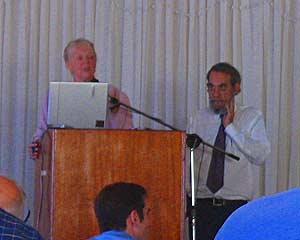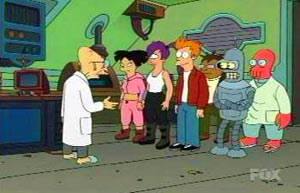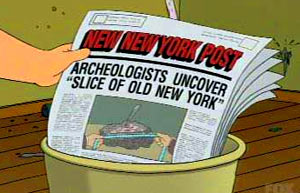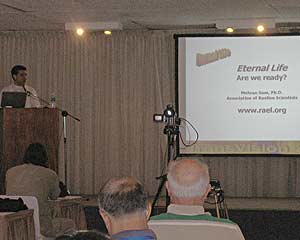The best way I can think of to describe this year’s
TransVision conference is likening it to a tattoo convention where the only things on display are bottles of ink, needles, and transparent paper. Technically, yes, those are some of the base elements involved in the craft—but on their own, they tell you absolutely nothing about the subject. More than that, even for beginners, they’re a useless starting point.
| |

CARACAS, VENEZUELA
|
Held this year in Caracas, Venezuela, TransVision is the
World Transhumanist Association’s annual conference, organized to bring together some of the movement’s best minds to teach one another—and, of course, the general public—about advances being made, new ideas, and generally provide a forum for intelligent discourse and debate on the subject.
Well, ideally, anyway. Reading last year’s report, I got the distinct impression that, while attendance was a little low, there were a number of very serious hard scientists there, working actively in the field to make transhumanist ideologies and desires—such as life extension, nanotech, and augmenting human beings with other helpful technologies—not only realities, but advancements that could occur within our lifetimes. There may have been a slight air of sci-fi wishy-washiness, but more out of necessity than in lieu of, well, real science.
To call this year’s conference a colossal failure would be an exaggeration; at the very least, it would be undiplomatic. While there were a handful of interesting seminars and speakers, by and large, the weekend was plagued by horrific scheduling (by the second day, talks were being pared down to a ridiculous fifteen to twenty minutes per person), presentations of dubious relevance (and more often than not, absolute irrelevance), and presenters who had evidently never spoken in public before.
I could easily write a report lambasting and lamenting these points. And I will. But to soften the blow, I’m dedicating some quotes from Fox’s often brilliant “Futurama” to the conference, as well as to my time in Venezuela �

“This is the worst part. The calm before the battle.”
“And then the battle is not so bad?”
“Oh, right. I forgot about the battle.”
Really, things got off on the wrong foot immediately.
Shannon and I arrived at the hotel that the conference was being held at the night before things were set to kick off, only to find that our rooms there hadn’t actually been confirmed. As appealing as roaming the evening streets of Caracas sounded, we ended up boarding with Emilio (IAM:Emilio Gonzalez), an incredibly gracious host who had no qualms about letting two bleary-eyed travelers stay at his house for several days—not to mention driving us around whenever and wherever we needed.
| |

What does Dr. Pablo Liendo think of Dr. Burton?
|
The conference began the following morning with a series of introductory talks by
Nick Bostrom (Chair of the WTA),
Lynn Elen Burton (an associate professor of Future Studies at Simon Fraser University in British Columbia),
Raj Bawa (a very bright professor at Rensslear Polytechnic Institute and the president of his own Biotechnology consulting business), and
Linda Groff (a professor of Political Science and Future Studies at California State University in Carson, CA).
While, in theory, beginning a conference of this sort by briefly catching everyone up to speed and insuring that the attendees are, by and large, on the same page is a good idea, the selection of topics and speakers for these introductions was suspect at best. Heavy traffic caused us to unfortunately miss the majority of Bostrom’s talk; however, we were just in time for Lynn Elen Burton’s discussion, plainly entitled “An Introduction to Transhumanism.”
The banality that ensued was, to be sure, one of the most useless forty-five minute-periods of my entire life.
Devoting her time to giving a dumbed-down history lesson on Aldous Huxley (and his brother Julian), H.G. Wells, Francis Bacon and other interesting yet wholly insignificant figures rather than arriving within even several miles of the topic at hand, Burton awkwardly stammered through nearly an hour of a barrage of mindless, meaningless facts disguised as ... I don’t even know what. This may just sound like lazy journalism, but her speech was literally devoid of absolutely anything worth repeating; the actual content was so sparse that even finding a particular point to criticize in depth would be arduous at best. The WTA and related organizations should avoid involving people like her in their causes like the plague; if they’re seeking mainstream credibility, the Burtons of the world will be the ones keeping them in the background forever.

“It’s a little experiment that might win me the Nobel Prize.”
“In which field?”
“I don’t care — they all pay the same.”
Bawa’s segment, fortunately, was not quite so insulting. Discussing advancements in Nanotechnology and the subsequent needs for patents in the area, Bawa offered up a clear view of one of the important business aspects that will actually be of legitimate concern to those involved with transhumanist science. This was, however, the beginning of a disturbing trend that would come even more to the fore as the weekend wore on: The battles and infighting within the transhumanist community over ownership, patents, and the importance of “who did what first” — contentious issues that seem to undermine actual progress — particularly when these arguments are over theoretical inventions and nonsensical terminology that serve as little more than techno-geek ego trips.

“This is my Universal Translator. It could have been my greatest invention, but it translates everything into an incomprehensible dead language.”
“Hello.”
“Bonjour!”
“See? Utter gibberish!”
Apparently, with over thirty countries represented, this was the most diverse TransVision conference yet, and to accommodate this fact, live translation was offered in both Spanish and English. While largely well-done, the translators were also being introduced to a number of scientific terms that they were likely not used to hearing and had to figure them out on the fly, leading to some moments of dead air and mumbled explanations of words.
One of the translators (they worked in shifts), however, was just mind-numbingly bad—imagine an asthmatic Horatio Sanz hemming and hawing in your ear while struggling to catch up with the speaker on-stage, only to be bailed out repeatedly by one of his more accomplished peers. Just one more thing to add to my already boiling vitriol.

“Oh my God. This is just like that drug trip I saw in that movie while I was on that drug trip.”
One of the wilder encounters I had at TransVision was with a woman by the name of Tatjana. A male-to-female transsexual (one of two at the event), she’s been taking estrogen supplements for close to two decades and has had a series of surgeries to this end.
Now, it is in no way my intention to be coarse or critical of this choice. That said, another disturbing trend I noticed was the absolute lack of social skills in many attendees. Don’t get me wrong, I’m not suggesting that everybody I meet should be practicing Martha Stewart living, but it’s agonizing and crippling to a conversation when it’s painfully clear that the person you’re speaking to can not really function fully in day to day life.
When we first met Tatjana, she approached us during the first day’s buffet lunch and asked to sit at our table, her shirt already stained with food. Sitting next to me, she devoured several more plates and pounded back no less than four cans of soda in roughly half an hour, pausing only to clear her throat every thirty seconds or so.
| |

Raelian Meditation

James Hughes discusses the
Right to Body Modification
|
(Imagine a cross between Janet Reno and Harvey Fierstein, except high on disassociative drugs and possibly infected with rabies.)
This was mildly revolting, and I’d be lying if I said that worrying about specks of food leaving her mouth and landing on my body didn’t put the fear of God in me, but I did my best to see what her story was.
As it turned out, she was a science fiction writer—not an uncommon find at a convention such as this—and was in the process of authoring a massive epic about an alternate America, actually already having reached many decades into the future; the book, by all accounts sounded rather interesting and, at the very least, meticulously detailed.
What we came to realize was that she could no longer differentiate between real life and her book. In the midst of discussions about modern-day problems and events, she would seamlessly segue into how these events go on to affect Jerry Springer’s presidential candidacy ten years from now, or go off on tangents about nine wizards eventually assuming control of the nation. Not only was there no differentiation, there was also no concept of time—she spoke about these happenings as if they had already occurred.
Curious as to how she can afford to devote her time to this endeavor, it was revealed that she had actually received an inheritance of several million dollars, and this nest egg allows her to write non-stop, day in and day out—right on, we should all be so lucky as to be able to dedicate all of our waking hours to our true passion in life. As well, she claimed to be at least sixty years old but looked at least ten years younger, a phenomenon which she attributed to mega-dosing on Vitamin C since 1984. To hear her tell it, “aging” is really just a manifestation of scurvy, and thus, insanely high doses of the vitamin are, in fact, the fountain of youth.
(Moving on ...)

“All right. It’s Saturday night, I have no date, a two-liter bottle of Shasta and my all-Rush mix-tape... Let’s rock.”
For all its faults, this year’s TransVision conference did have one thing to offer that past years seemed to be missing: The overwhelming presence of hard liquor. Wrapping up his closing speech at the end of the first day, organizer
José Cordeiro was vehement in his demands that everyone present stick around and enjoy some 100-year-old rum that he had been saving just for this occasion. While all manner of nerds—and make no mistake, I absolutely include myself in this grouping—made short work of the multiple bottles, local musicians roamed the grounds, playing traditional music and unsuccessfully petitioning the attendees to dance the night away. Your usual science and technology convention, this wasn’t.

“Let’s face it, comedy is a dead art form. Now tragedy, ha ha ha, that’s funny.”
This one is for José Cordeiro, the aforementioned organizer of this year’s convention. Extremely affable, José introduced every one of the speakers, though in a strange twist, included funny (but undeniably racy) ethnic humor in each of his introductions. For example, while introducing a man from Italy:
“Our next presenter is from Italy ... but nobody’s perfect! And he’s from Naples, it’s hard to get any lower than that! ... Okay, Sicily.”
When he had to cut off a presenter from Germany, he “apologized for having to be so German with the time,” but thought the guy would understand. Was Larry the Cable Guy writing his material? This all came right out of left field.
Finally, on the discussions of holding TransVision in Finland in 2006:
“TransVision might be in a silly country like Finland next year, and they speak a language that not even the Martians or Raelians can understand! Why do 5 million people speak such a silly, useless language?”
Damn, José.

“The Vegas odds tonight stand at an unprecedented 1000 to 0. A bet of zero dollars on Bender pays 1000 dollars if he wins. Still, very few takers.”
Having been barred from speaking at TransVision for the past few years, a delegate from the Raelians (
www.rael.org) was given a slot to speak at this year’s event. Finding himself the butt of many jokes,
Mehran Sam—the Raelian—was a very good sport about the whole thing. A brilliant Bioinformatics scientist, Mehran, in addition to leading twice-daily meditation sessions, gave a short speech on the prospects of eternal life. As was the case with far too many of the speakers, the focus of the talk was on
why people would want to live forever.
This was a serious problem that I had, both with this speech in particular and with countless others; talking about the “why” in a setting like that is preaching to the choir. You don’t have to be a genius to understand why things like this are important or worthwhile, but if all you have to offer is a set of talking points about the philosophy of your idea and no hard facts or science to back it up, it doesn’t matter how wonderful you make your concept sound—no one is going to buy into it.

“Wow. They discovered an intact 20th century pizzeria. Just like the one I used to work at.”
“Interesting. No, wait. The other thing. Tedious.”
It’s extremely frustrating to be surrounded by a few hundred ostensibly intelligent people in a forum where they can let loose and talk about all the work they’re doing, and then for them to have absolutely nothing meaningful to present. You can wax philosophical about life extension and artificial intelligence all you like, but if no physical work is being done to get these ideas off paper, then it’s nothing more than science fiction. Yes, your slides from “The Matrix” and “Johnny Mnemonic” are very clever, but no, they don’t matter.

“Dear Horse God, I know I don’t usually pray to you. Sometimes I doubt you even exist, but if you’re willing to grant me luck... please... stamp your hoof for once.”
One of the truly
compelling speakers was
Dan Barker, a former evangelical Christian and current co-president of the Freedom From Religion Foundation (
www.ffrf.org). Telling his story of growing up in a highly-religious Christian household, he recalled living in constant wait for the end of the world and the second coming of Christ—believing, in no uncertain terms, that he would see rapture in his lifetime.
| |

ETERNAL LIFE:
Are we ready?
|
Obviously, things didn’t work out quite as he was expecting, and his story shifted into his subsequent loss of faith—occasionally breaking out into song or ministerial wailing for emphasis. And then ... that was it. An attention-grabbing, well-spoken, brief religious autobiography.
Right.
Now, I don’t entirely fault Barker for this—I have no doubt that he had an insightful speech to share, but diabolically bad scheduling left him—and everyone else from the second and third days—only fifteen minutes of speaking time, which is utterly unacceptable. Originally scheduled to take place in two rooms and have talks going simultaneously, this idea was scrapped at apparently the last minute, leaving these people—many of them horrid public speakers to begin with—to be forced to make last-minute changes and, in some cases, rewrite their talks entirely in order to fit into the new schedule.
With such a troubling amount of incredibly useless and unnecessary talks given, it was plain to see that presenters with real points to make could have easily been given all the time they desired if some of the other fat had been trimmed. But alas, this was not meant to be ... and yet, Lynn Elen Burton was given a slot for a second soul-crushingly moronic talk on the third day. I will never understand this.

“You know, boys, a good captain needs abilities like boldness, daring and a good velour uniform, and I’m not convinced Leela has any of those things.”
I realize that I’ve been overwhelmingly negative about my entire experience at TransVision, and with good reason; after hearing about last year’s much more scientific-minded conference and having a pre-established interest in transhumanism, I went in with high expectations—anticipating hearing about
first-hand research and experiments, and evidence that some of these dreams were becoming reality—and was horribly let down. The talks that actually directly related to transhumanism were little more than pseudo-philosophical mumbo-jumbo, and many contained precisely the same “information,” albeit arranged slightly differently—some people even used the same quotes as one another!
| |

REAL-LIFE TRANSHUMANISM?
Shannon with Emilio Gonzalez
|
That said, there were a few bright moments. Princeton student Jordan Amadio,
one of the top students in America, spoke firsthand about a month-long trip he spent in various countries in sub-Saharan Africa, including Namibia and South Africa. There in conjunction with a World Bank sponsored project, Amadio relayed his experiences getting to see the blossoming African Biotechnology field, and spoke highly of its potential. He saw more of a future for the Africans, however, in Nanotechnology; as it stands, the African scientists, while being successful in their own right with Biotech, are essentially emulating and playing catch-up with scientists from elsewhere in the world. What Amadio posits, however, is that if they were to focus their efforts on Nanotech, they could effectively
leapfrog these other countries, making developments in arenas that others haven’t had the chance to fully explore as of yet. He went on to discuss teachers going into small tribal villages and teaching the inhabitants modern science, but by associating the lessons with facets of their own lives, and remarked upon how well the majority are taking to it. If this proceeds, some expect Africa to be able to make a real name for itself in fields that it has, until now, been absent from.
This, to me, seemed more like the embodiment of true transhumanist values than any of the nonsensical ramblings I was subjected to otherwise—the idea of making humans the absolute best they can be. While some philosophical movements in transhumanism—such as the idea that the human body is the weakest, most flawed vessel for our mind to inhabit and that our future will consist of living on within machines—are questionable on many moral and ethical levels, this struck me as a very basic, yet virtuous mission that really does help people improve themselves.
Amadio followed this up, though, with an offhand mention that these people will be easily exploited due to weak patent protection laws in developing nations (thus allowing transnational corporations to aquire the technologies), and this sweet little vision of virtue disappeared.
Simply put, TransVision 2005 was a train wreck: Chaotically arranged, with literally next to nothing in the way of new information—most of the facts relayed in the presentations could likely be found in the FAQ on each presenter’s web site—or anything that would inspire a novice to the idea to pursue it further, this is the sort of thing that sinks fledgling movements.
Let’s hope the Fins with their “silly, useless language” can pull off a conference with some real merit next year.
- Jordan Ginsberg (IAM:snackninja, [email protected])
IAM members click here to discuss or comment on this article

















